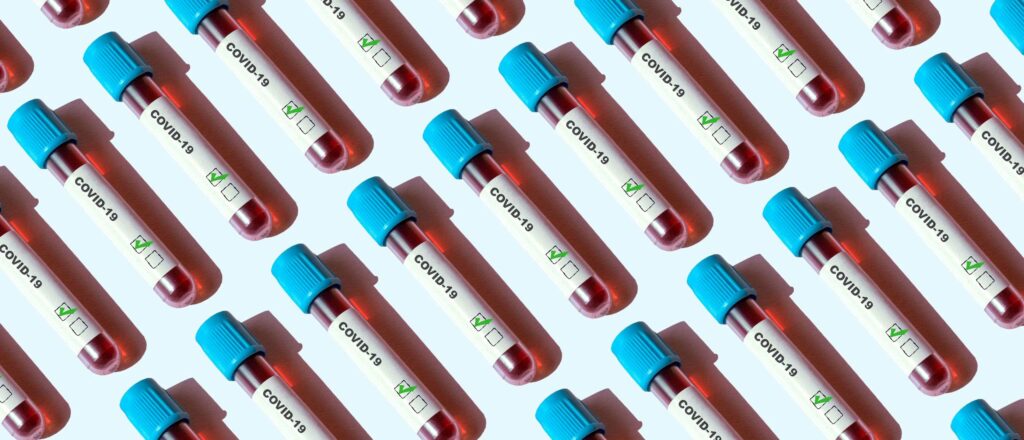COVID-19 and Testosterone Levels: What You Need To Know
- By Jennifer Chesak
- Fact-checked by Stephanie Abramson
- April 8, 2022
Fast Facts
- Research shows that both low and high testosterone are associated with COVID-19 severity.
- COVID-19 may also lower testosterone levels and cause erectile dysfunction.
- If you’ve had COVID-19 and your testosterone levels are low, they may rebound naturally.
Throughout the pandemic, researchers have puzzled over how many factors—including social, environmental, and economic—impact how severe COVID-19 symptoms might be if you contract the virus. They’ve also been looking at how hormones, particularly estrogen and testosterone, might play a role. When it comes to COVID and testosterone, some researchers have called the sex hormone a “double edge sword,” (1) because both high and low T levels have some association with worse COVID symptoms and outcomes.
Researchers are also looking at how COVID impacts sexual health. The virus, like many illnesses, can cause testosterone levels to drop, potentially causing erectile dysfunction, fatigue, and other symptoms of low T.
“There’s a lot of other outcomes from illness other than death,” says Ashley Winter, M.D., a board-certified urologist in practice in Portland, Oregon. “It’s highly probable that the worse your COVID infection is, the more of a profound and lasting impact that is going to have on your sexual and reproductive function.”
Ideally, says Winter, you should try not to get COVID. But for many men getting the virus is unavoidable—and millions of others have already had the virus.
Here’s what researchers have learned so far about COVID and testosterone, and what they’re looking at next.
COVID and Low Testosterone
In the past two years, several studies have shown some correlation between low testosterone and worse COVID 19 symptoms and outcomes. But researchers don’t know if the men got severe COVID because their testosterone levels were low, if severe COVID caused their T levels to drop, or if the men already had low testosterone levels when they contracted the virus because they had underlying conditions—like obesity and diabetes—that are also risk factors for severe COVID-19.
“Unfortunately, I don’t think—in all these studies—they have data on what these people’s baseline testosterone was before they ever had COVID,” Winter says. “It’s such a chicken and the egg thing.”
One small study, (2) published in May 2021, analyzed the hormone levels of 90 men and 62 women who tested positive for COVID-19 from March through May 2020. Researchers measured the patients’ testosterone, estradiol, and insulin-like growth factor 1 (IGF-1) when they first came to the hospital and throughout their stay.
No link was found between worse illness and any hormone among the women. But they discovered that men with lower testosterone levels (defined as 250 ng/dL or less in the study) experienced more severe COVID-19 symptoms. The average testosterone level for men who were severely ill when they were admitted to the hospital was 53 ng/dL. Men who had less severe symptoms had an average T level of 151 ng/dL. Those who were the sickest had an average level of only 19 ng/dL by day three.
Related: What Are Normal Testosterone Levels By Age?
Some factors and conditions that increase your risk for severe illness from COVID-19—such as obesity, diabetes, and older age—are also linked with low testosterone. So when looking at the link between COVID and testosterone, the researchers can’t be sure that COVID-19 caused T levels to drop.
“The average age of the men who had severe COVID were older, and they had more comorbidities,” says Winter, who was not involved in the research. “And being older and having more comorbidities is associated with having lower testosterone. And being older and having more comorbidities is associated with having more severe COVID.”
In another small study, (3) researchers looked at the testosterone levels of men who were admitted to the same hospital in Austria with COVID-19 during 2020.
Men with severe disease had lower testosterone levels, and the lower their T levels were, the higher their risk of dying from COVID-19 at the hospital. Men with a testosterone level 100 ng/dL or lower were 18 times more likely to die in the hospital from COVID-19, compared to those with a level above 230 ng/dL.
Here again, the study authors acknowledged that without knowing the baseline T levels for the patients before getting COVID-19, they can’t definitively say whether low testosterone leads to severe COVID-19 or if COVID-19 is suppressing the hormone in severely ill men.
Two additional small studies, one in Germany (4) and another in Italy, (5) have produced similar results, showing a link—although unclear—between low T and severe COVID-19.
Both high and low T levels have some association with worse COVID symptoms and outcomes
COVID-19 Severity and High Testosterone
Although the studies on low testosterone and COVID-19 are somewhat inconclusive, they may help debunk the notion that low T could somehow protect against severe COVID-19, says Winter.
When researchers first noticed that men had higher rates of severe COVID than women, it led to an initial hypothesis “that somehow testosterone has a mechanism in making COVID a bit worse,” says Winter. But that initial theory about COVID and testosterone seems less likely now.
A growing body of evidence does show that high testosterone may increase COVID-19 infectivity and severity. But Winter says that this doesn’t mean that men with testosterone deficiencies who are on testosterone replacement therapy (TRT) should stop treatment.
Related: How to Legally Buy Testosterone Online
“If you do have low testosterone,” she says, “being on testosterone supplementation at appropriate levels does help with a lot of cardiometabolic risk factors. It can improve, for example, your A1C—your glycemic control. And those things would actually be protective against COVID-19.”
Low Testosterone Levels After COVID-19
As a general rule, being sick can temporarily lower testosterone levels. “There can be an effect on your testicles and your sperm after even just having a cold or some other illness that is accompanied by a fever,” Winter explains.
The same is true when it comes to COVID-19, suggests research published in Andrology (6) Researchers looked at the T levels of a small group of men who had recovered from the virus. The men had their testosterone levels measured when they were admitted to the hospital, and again seven months later. Although most of the mens’ T levels had increased by the time of follow-up (87.6 percent), more than half (55 percent) of those who showed an increase still had T levels below normal. And for almost 10 percent of patients, their T levels had dropped.
“Of course, we don’t have the baseline,” says Winter, who was not involved in the research. “But what we do see in that study is that the testosterone level a number of months out are higher than at the beginning of the study.” In other words, illness possibly lowered their T level rather than it being low, to begin with. And then it increased again after a lengthy recovery period. However, more than half of the subjects still had low testosterone levels.
COVID-19 and Erectile Dysfunction
When researching COVID and testosterone, it’s not just T levels that researchers are looking at. Scientists have also found that men who have had COVID-19 are about 3 times more likely (7) to experience erectile dysfunction (ED), according to one study, published in the Journal of Endocrinological Investigation. When researchers combed through the hospital records of patients with COVID-19, they found that 146 of the roughly 3,000 male patients had been diagnosed with ED after their COVID-19 diagnosis.
Winter says COVID-19 can have a direct effect on the male sex organ. A study published in 2021 in The World Journal of Men’s Health shows that virus particles can linger (8) in endothelial cells—cells that line blood vessels—in the penis even after recovery from infection.
“One of the ways that COVID affects the body is something called endothelial dysfunction,” Winter explains. “You have a ton of endothelial cells in your penis. If they become damaged, it can lead to less response of that tissue expanding with blood and trapping blood and staying hard.”
Related: Why Can’t I Get and Keep an Erection?
What You Need to Know About Testosterone Levels After COVID-19
If you have symptoms of low T, including erectile dysfunction, low libido, or struggling to build muscle even though your workouts haven’t changed, it’s worth talking to your doctor about your testosterone level. If you’re recovering from COVID and bloodwork shows that your testosterone level is low, Winter suggests waiting a few months and having it checked again before considering TRT.
“Once you start taking testosterone,” she explains, “you’re never going to know if you could have rebounded naturally.”
References:
1. Younis J, Skorecki K, Abassi Z. The Double Edge Sword of Testosterone’s Role in the COVID-19 Pandemic. Front Endocrinol (Lausanne). 2021;12. doi:10.3389/fendo.2021.607179
2. Dhindsa S, Zhang N, McPhaul M et al. Association of Circulating Sex Hormones With Inflammation and Disease Severity in Patients With COVID-19. JAMA Netw Open. 2021;4(5):e2111398. doi:10.1001/jamanetworkopen.2021.11398
3. Lanser L, Burkert F, Thommes L, et al. Testosterone Deficiency Is a Risk Factor for Severe COVID-19. Front Endocrinol (Lausanne). 2021;12. doi:10.3389/fendo.2021.694083
Schroeder M, Schaumburg B, Mueller Z et al. High estradiol and low testosterone levels are associated with critical illness in male but not in female COVID-19 patients: a retrospective cohort study. Emerging Microbes & Infections. 2021;10(1):1807-1818. doi:10.1080/22221751.2021.1969869
4. Rastrelli G, Di Stasi V, Inglese F et al. Low testosterone levels predict clinical adverse outcomes in SARS‐CoV‐2 pneumonia patients. Andrology. 2020;9(1):88-98. doi:10.1111/andr.12821
5. Salonia A, Pontillo M, Capogrosso P et al. Testosterone in males with COVID‐19: A 7‐month cohort study. Andrology. 2021;10(1):34-41. doi:10.1111/andr.13097
Katz J, Yue S, Xue W, Gao H.Increased odds ratio for erectile dysfunction in COVID-19 patients.J Endocrinol Invest. 2021. doi:10.1007/s40618-021-01717-y
6. Kresch E, Achua J, Saltzman R, et al. COVID-19 Endothelial Dysfunction Can Cause Erectile Dysfunction: Histopathological, Immunohistochemical, and Ultrastructural Study of the Human Penis. World J Mens Health. 2021;39(3):466. doi:10.5534/wjmh.210055







